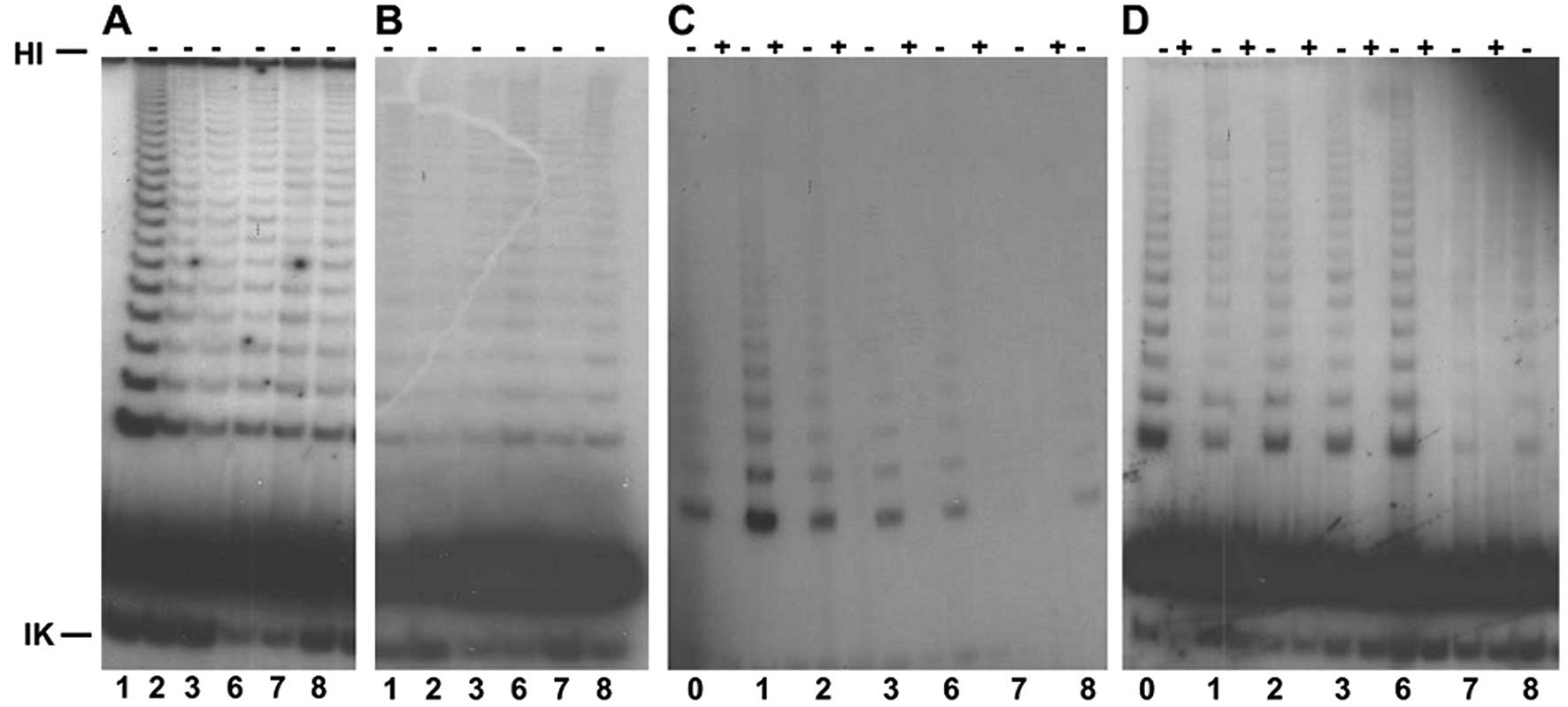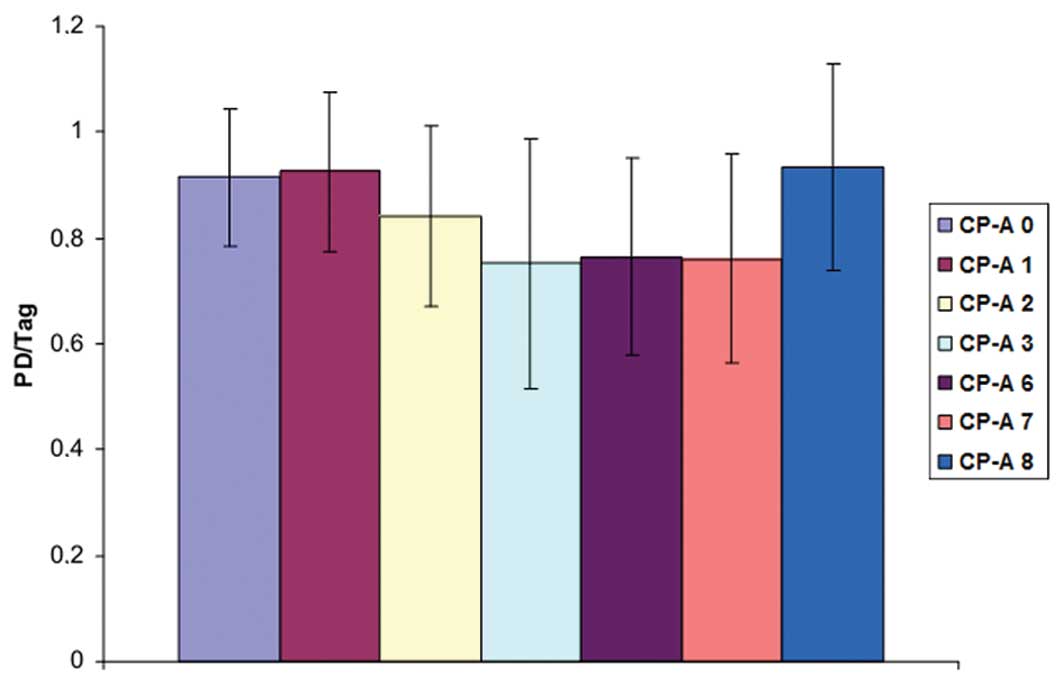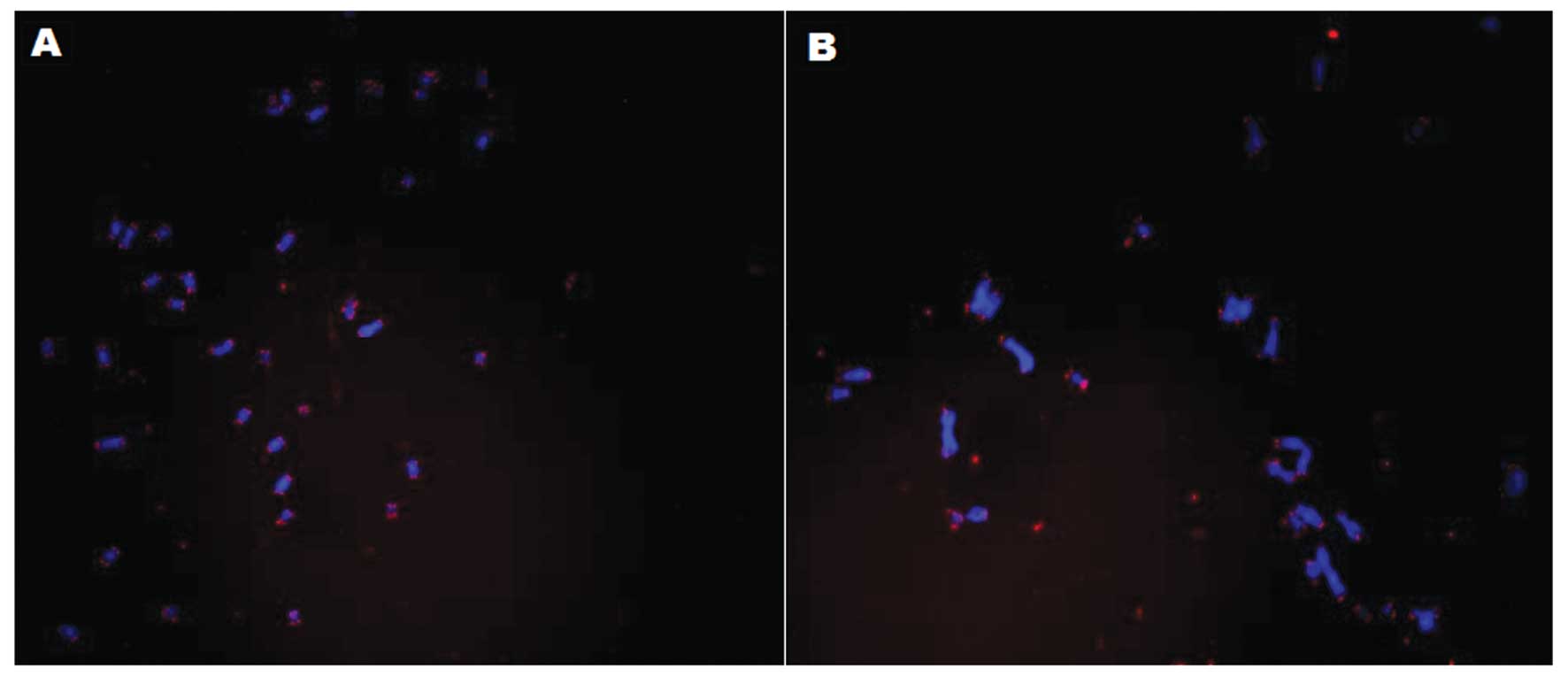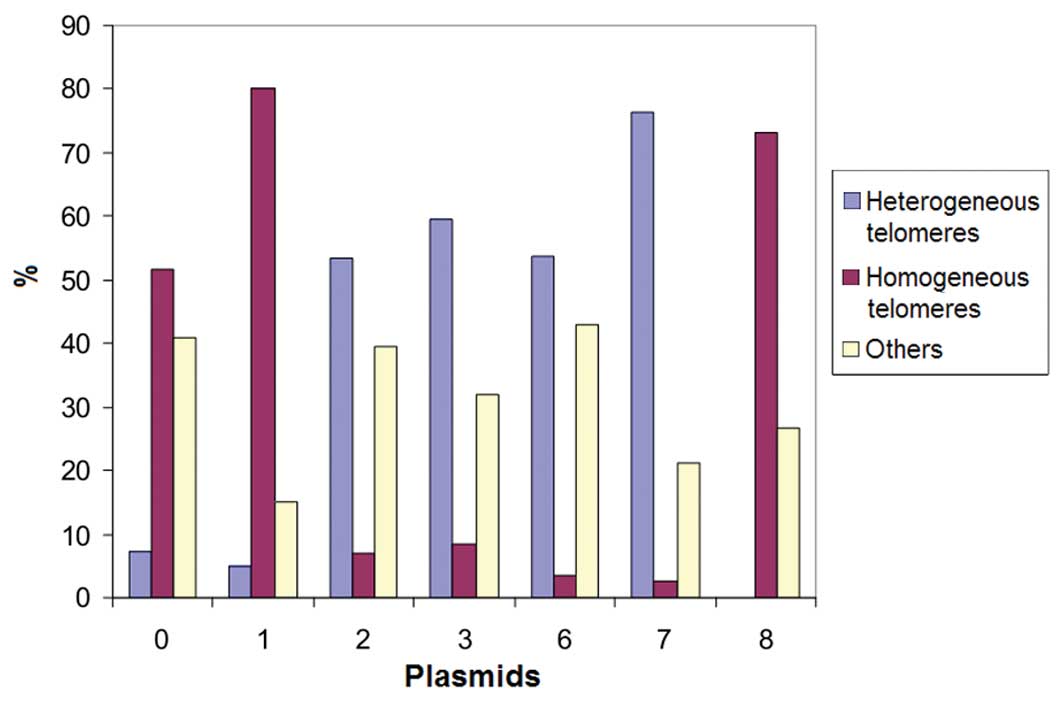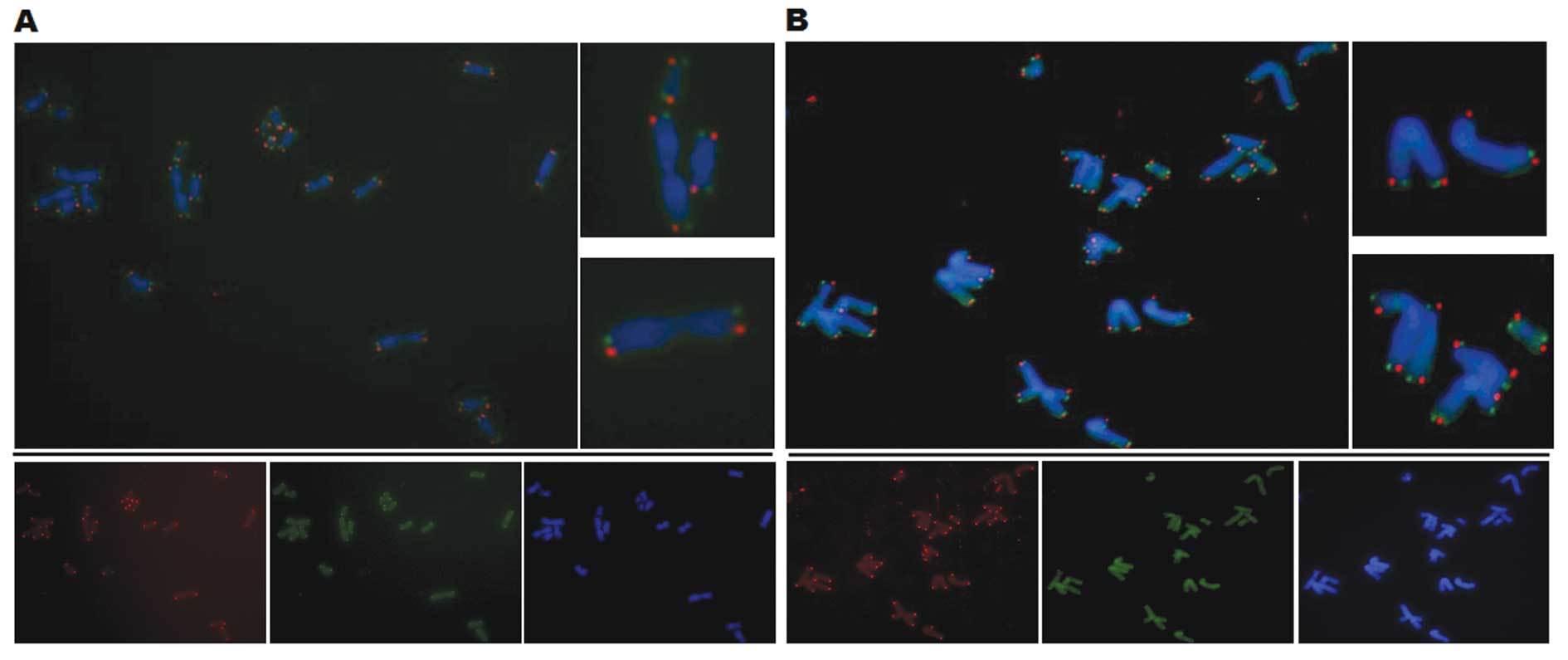|
1
|
Harley CB, Futcher AB and Greider CW:
Telomeres shorten during ageing of human fibroblasts. Nature.
345:458–460. 1990. View
Article : Google Scholar : PubMed/NCBI
|
|
2
|
Hahn WC and Meyerson M: Telomerase
activation, cellular immortalization and cancer. Ann Med.
33:123–129. 2001. View Article : Google Scholar : PubMed/NCBI
|
|
3
|
Wright WE and Shay JW: Cellular senescence
as a tumor-protection mechanism: the essential role of counting.
Curr Opin Genet Dev. 11:98–103. 2001. View Article : Google Scholar : PubMed/NCBI
|
|
4
|
Kim NW, Piatyszek MA, Prowse KR, et al:
Specific association of human telomerase activity with immortal
cells and cancer. Science. 266:2011–2015. 1994. View Article : Google Scholar : PubMed/NCBI
|
|
5
|
Schaetzlein S, Lucas-Hahn A, Lemme E, et
al: Telomere length is reset during early mammalian embryogenesis.
Proc Nat Acad Sci USA. 101:8034–8038. 2004. View Article : Google Scholar : PubMed/NCBI
|
|
6
|
Dahse R, Fiedler W and Ernst G: Telomeres
and telomerase: biological and clinical importance. Clin Chem.
43:708–714. 1997.PubMed/NCBI
|
|
7
|
Allsopp RC, Cheshier S and Weissman IL:
Telomere shortening accompanies increased cell cycle activity
during serial transplantation of hematopoietic stem cells. J Exp
Med. 193:917–924. 2001. View Article : Google Scholar : PubMed/NCBI
|
|
8
|
Son NH, Murray S, Yanovski J, et al:
Lineage-specific telomere shortening and unaltered capacity for
telomerase expression in human T and B lymphocytes with age. J
Immunol. 165:1191–1196. 2000. View Article : Google Scholar : PubMed/NCBI
|
|
9
|
Masutomi K, Yu EY, Khurts S, et al:
Telomerase maintains telomere structure in normal human cells.
Cell. 114:241–253. 2003. View Article : Google Scholar : PubMed/NCBI
|
|
10
|
Hayflick L and Moorhead PS: The serial
cultivation of human diploid cell strains. Exp Cell Res.
25:585–621. 1961. View Article : Google Scholar : PubMed/NCBI
|
|
11
|
Hahn WC and Weinberg RA: Rules for making
human tumor cells. N Engl J Med. 347:1593–1603. 2002. View Article : Google Scholar : PubMed/NCBI
|
|
12
|
Opitz OG, Suliman Y, Hahn WC, et al:
Cyclin D1 overexpression and p53 inactivation immortalize primary
oral keratinocytes by a telomerase-independent mechanism. J Clin
Invest. 108:725–732. 2001. View Article : Google Scholar : PubMed/NCBI
|
|
13
|
Goessel G, Quante M, Hahn WC, et al:
Creating oral squamous cancer cells: a cellular model of
oral-esophageal carcinogenesis. Proc Natl Acad Sci USA.
102:15599–15604. 2005. View Article : Google Scholar : PubMed/NCBI
|
|
14
|
Heeg S, Hirt N, Queisser A, et al: EGFR
overexpression induces activation of telomerase via
PI3K/AKT-mediated phosphorylation and transcriptional regulation
through Hif1-alpha in a cellular model of oral-esophageal
carcinogenesis. Cancer Sci. 102:351–360. 2011. View Article : Google Scholar
|
|
15
|
Lansdorp PM, Verwoerd NP, van de Rijke, et
al: Heterogeneity in telomere length of human chromosomes. Hum Mol
Genet. 5:685–691. 1996. View Article : Google Scholar : PubMed/NCBI
|
|
16
|
Li S, Rosenberg JE, Donjacour AA, et al:
Rapid inhibition of cancer cell growth induced by lentiviral
delivery and expression of mutant-template telomerase RNA and
anti-telomerase short-interfering RNA. Cancer Res. 64:4833–4840.
2004. View Article : Google Scholar : PubMed/NCBI
|
|
17
|
Pickett HA, Cesare AJ, Johnston RL, et al:
Control of telomere length by a trimming mechanism that involves
generation of t-circles. EMBO J. 28:799–809. 2009. View Article : Google Scholar : PubMed/NCBI
|
|
18
|
McEachern MJ and Blackburn EH: Runaway
telomere elongation caused by telomerase RNA gene mutations.
Nature. 376:403–409. 1995. View
Article : Google Scholar : PubMed/NCBI
|
|
19
|
Singer MS and Gottschling DE: TLC1:
template RNA component of Saccharomyces cerevisiae
telomerase. Science. 266:404–409. 1994. View Article : Google Scholar : PubMed/NCBI
|
|
20
|
Yu GL, Bradley JD, Attardi LD, et al: In
vivo alteration of telomere sequences and senescence caused by
mutated Tetrahymena telomerase RNAs. Nature. 344:126–132.
1990. View
Article : Google Scholar : PubMed/NCBI
|
|
21
|
Bryan TM, Englezou A, Gupta J, et al:
Telomere elongation in immortal human cells without detectable
telomerase activity. EMBO J. 14:4240–4248. 1995.PubMed/NCBI
|
|
22
|
Döbele M, von Werder A, Fulda C, et al:
Inhibition of telomerase by mutant template telomerase RNA and
anti-telomerase short interfering RNA induces ALT in immortalized
human epithelial cells. Z Gastroenterol. 44:P2812006.PubMed/NCBI
|
|
23
|
Cristofari G and Lingner J: Telomere
length homeostasis requires that telomerase levels are limiting.
EMBO J. 25:565–574. 2006. View Article : Google Scholar : PubMed/NCBI
|
|
24
|
Bianchi A and Shore D: How telomerase
reaches its end: mechanism of telomerase regulation by the
telomeric complex. Mol Cell. 31:153–165. 2008. View Article : Google Scholar : PubMed/NCBI
|
|
25
|
Smogorzewska A and de Lange T: Regulation
of telomerase by telomeric proteins. Annu Rev Biochem. 73:177–208.
2004. View Article : Google Scholar : PubMed/NCBI
|
|
26
|
Smogorzewska A, van Steensel B, Bianchi A,
et al: Control of human telomere length by TRF1 and TRF2. Mol Cell
Biol. 20:1659–1668. 2000. View Article : Google Scholar : PubMed/NCBI
|
|
27
|
Collado M, Blasco MA and Serrano M:
Cellular senescence in cancer and aging. Cell. 130:223–233. 2007.
View Article : Google Scholar : PubMed/NCBI
|
|
28
|
Bechter OE, Zou Y, Walker W, et al:
Telomeric recombination in mismatch repair deficient human colon
cancer cells after telomerase inhibition. Cancer Res. 64:3444–3451.
2004. View Article : Google Scholar
|
|
29
|
Londono-Vallejo JA, Der-Sarkissian H,
Cazes L, et al: Alternative lengthening of telomeres is
characterized by high rates of telomeric exchange. Cancer Res.
64:2324–2327. 2004. View Article : Google Scholar : PubMed/NCBI
|
|
30
|
Broccoli D, Young JW and de Lange T:
Telomerase activity in normal and malignant hematopoietic cells.
Proc Natl Acad Sci USA. 92:9082–9086. 1995. View Article : Google Scholar : PubMed/NCBI
|
|
31
|
Von Werder A: Immortalized human
esophageal squamous epithelial cells maintain their telomerases by
either telomerase or ALT in a cell cycle-dependent fashion.
http://www.biomedsearch.com/sci/immortalized-human-esophageal-squamous-epithelial/0040149415.html.
2007
|















